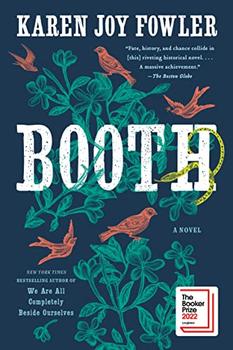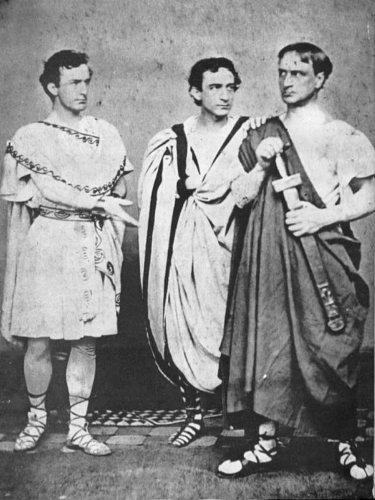Summary | Excerpt | Reading Guide | Reviews | Beyond the Book | Read-Alikes | Genres & Themes | Author Bio

Critics' Opinion:
Readers' Opinion:
First Published:
Mar 2022, 480 pages
Paperback:
Feb 2023, 480 pages
 Book Reviewed by:
Book Reviewed by:
Rebecca Foster
Buy This Book
This article relates to Booth
 Karen Joy Fowler's Booth features several characters who are Shakespearean actors, starting with Junius Brutus Booth, who was born in England in 1796 and emigrated to the United States in 1821. He managed the Adelphi Theatre in Baltimore in the 1830s and also toured internationally, becoming very well-known in the U.S. and abroad. All told, he featured in almost 3,000 stage performances. His son Edwin would go on to be lauded as one of the greatest American actors of the 19th century, especially noted for his role as Hamlet. Older son Junius Booth Jr. was an actor in his own right, as well as a theater director.
Karen Joy Fowler's Booth features several characters who are Shakespearean actors, starting with Junius Brutus Booth, who was born in England in 1796 and emigrated to the United States in 1821. He managed the Adelphi Theatre in Baltimore in the 1830s and also toured internationally, becoming very well-known in the U.S. and abroad. All told, he featured in almost 3,000 stage performances. His son Edwin would go on to be lauded as one of the greatest American actors of the 19th century, especially noted for his role as Hamlet. Older son Junius Booth Jr. was an actor in his own right, as well as a theater director.
The first known U.S. performance of Shakespeare was in 1730: an amateur production of Romeo and Juliet in New York City. Shakespeare was especially beloved by America's Founding Fathers. But it was in the 19th century that the playwright's work became popular across the country, and among all classes of people. French observer Alexis de Tocqueville noted the bard's popularity in 1835's Democracy in America: "There is scarcely a pioneer's hut where one does not encounter some odd volumes of Shakespeare."
Cheap editions had allowed Shakespeare's plays to become as popular with poor homesteading families as with the educated elite, and copies of the complete works are known to have been carried across the Plains. Speeches from Shakespearean plays were included in McGuffey Readers, so generations of young people grew up memorizing passages for school. In 1833, James Fenimore Cooper remarked, "Shakespeare is, of course, the great author of America, as he is of England, and I think he is quite as well relished here as there."
Traveling theater companies also took the works of Shakespeare across the North American continent. Acting troupes performed the plays at Mississippi River landings and on barges. Mark Twain's Huckleberry Finn poked fun at these 1830s-40s performances through dialogue spoken by the characters claiming to be the Duke of Bilgewater and the King of France, with quotes and references cobbled together from multiple plays. During the mid-century Gold Rush, theaters were quickly constructed in California to help miners fill their leisure hours with (relatively) wholesome entertainment. Edwin Booth traveled to California in 1848 and performed Othello and The Taming of the Shrew; his brother, Junius Jr., debuted with Hamlet in San Francisco in 1851. Between 1850 and 1860, twenty-two of Shakespeare's plays were produced in San Francisco.
The 300th anniversary of Shakespeare's birth, in 1864, prompted major celebrations in the U.S., with public readings, commemorative articles and a statue of Shakespeare commissioned for Central Park in New York City. Edwin Booth assisted in the fundraising for that statue with an 1864 benefit performance of Julius Caesar, starring himself as Brutus and brothers John Wilkes as Marc Antony and Junius Jr. as Cassius. (It was a Latin phrase attributed to Brutus, one of the assassins of Julius Caesar, that John Wilkes Booth shouted after he shot Lincoln: "sic semper tyrannis" — "thus always to tyrants.") The statue was finally erected in 1872, and Edwin laid the cornerstone, a fitting task for a representative of a family so pivotal in Shakespeare's 19th-century takeover of America.
Left to right: John Wilkes Booth, Edwin Booth and Junius Booth Jr. in Shakespeare's Julius Caesar in 1864, unknown photographer
Filed under Music and the Arts
![]() This "beyond the book article" relates to Booth. It originally ran in March 2022 and has been updated for the
February 2023 paperback edition.
Go to magazine.
This "beyond the book article" relates to Booth. It originally ran in March 2022 and has been updated for the
February 2023 paperback edition.
Go to magazine.





The Funeral Cryer by Wenyan Lu
Debut novelist Wenyan Lu brings us this witty yet profound story about one woman's midlife reawakening in contemporary rural China.
Your guide toexceptional books
BookBrowse seeks out and recommends the best in contemporary fiction and nonfiction—books that not only engage and entertain but also deepen our understanding of ourselves and the world around us.